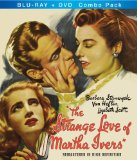| Reviews & Columns |
|
Reviews DVD TV on DVD Blu-ray 4K UHD International DVDs In Theaters Reviews by Studio Video Games Features Collector Series DVDs Easter Egg Database Interviews DVD Talk Radio Feature Articles Columns Anime Talk DVD Savant Horror DVDs The M.O.D. Squad Art House HD Talk Silent DVD
|
DVD Talk Forum |
|
|
| Resources |
|
DVD Price Search Customer Service #'s RCE Info Links |
|
Columns
|
|
|
Strange Love of Martha Ivers Blu-Ray + DVD Combo Pack
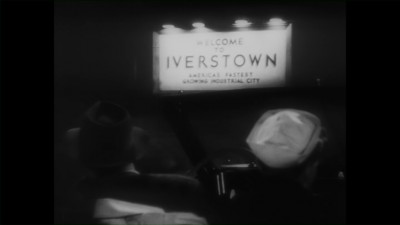
Please Note: All of the images used here are from the accompanying standard-definition DVD and are not taken from the Blu-ray under review.
It's always a dark and stormy night in the midsized Pennsylvania industrial burg of Iverstown, where Lewis Milestone's (All Quiet on the Western Front) 1946 film The Strange Love of Martha Ivers is set. The pitch-black weather sets the right mood for such a place, where everyone's got a secret, plenty of well-disguised ambition, and who knows what where their heart or conscience should be. It's the kind of place where everyone seems to be caught in a web of long-unfulfilled desires and unsavory pasts they may or may not regret but, out of shame or expediency (or both), are desperate to hide. It's the place where Martha Ivers (Barbara Stanwyck, in a sort of captivating reprise of her Double Indemnity femme fatale) grew up as an orphan in the charge of her stone-faced, plutocratic aunt (Judith Anderson, working the same creepy, repressed sternness she brought to her Mrs. Danvers in Hitchcock's Rebecca), and where she fell in love with Sam Masterson, a boy from the wrong side of the tracks, with the two plotting to run away together. The film opens on the especially tempestuous night when Martha and Sam's plan to run away has been thwarted, followed by a tense, emotionally violent confrontation between Martha and her aunt, with Martha's social-climbing teacher Mr. O'Neill having brought his son Walter, the schoolmate who gave away Sam and Martha's plan, to, he hopes, be well rewarded from the Ivers coffers. Lightning flashes, thunder roars, and the power goes out, blanketing the Ivers mansion in a cloak of darkness under which Martha's anger is unleashed in an act against her aunt that will, in a cruel irony, exile Sam from Iverstown but trap her there forever.
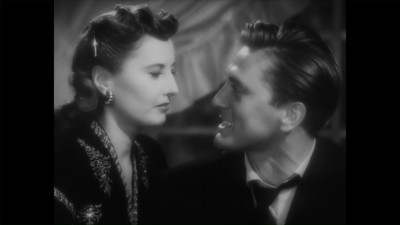
That was all in 1928, and it's played out with a masterfully wrought aura of mounting desperation in an extended prologue that, with ace-artist cinematographer Victor Miler (who had shot for Ernst Lubitsch early on, had filmed Stanwyck for Preston Sturges in The Lady Eve, and would go on to do so again for Anthony Mann in The Furies) creating an oppressive, damp, daringly dark atmosphere that only gets darker and wetter as the night goes on, sets the stage for the rest of the film, which takes place in the present (i.e., the mid-'40s). Forced by that earlier decisive night into her position as heir to her aunt's power and money, Martha has spent the intervening years of her life tormented by the luxuries and influence that life affords and the bitter compromise it represents; the defiant, idealistic young girl who almost got away has now been sucked into her aunt's world of hunger for power and money, funding and puppeteering her district-attorney husband, the grown-up Walter O'Donnell (Kirk Douglas), who has now become an alcoholic yes-man to his wife instead of his father and leads a life of humiliating, unethical collusion with the woman whose dark secrets bind them together. Yet he still loves her (if Martha's strange love is the torch she's carried all this time for Sam and the pure freedom he represents, Walter's is for Martha), which becomes a liability for everyone when Walter and Martha's grim marital situation is inflamed and ultimately brought to a tragic head when Sam (played as an adult by Van Heflin), who's been blowing around the country after a stint in the military/World War II as a rambling, freewheeling, independent fella, is pulled once again into the nefarious clutches of Iverstown when he's passing through and has a freak car accident -- a coincidence plays as if it could be just careless driving or a sudden bend in the road or, just as likely, the bitter spirit of Iverstown's recognition of one of its own and unwillingness to let him escape a second time.
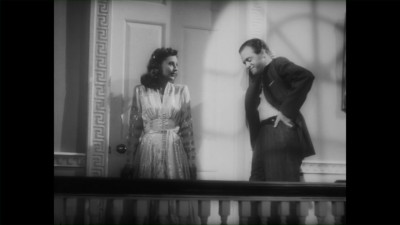
Temporarily grounded by a car in need of repair (a stay in the shop that Martha, once she's aware of Sam's unplanned return, is soon pulling strings to extend), Sam has taken up with Toni, an Iverstown girl who, like him, knows it's a contagious rat-maze and is frantic to get out. As played by Lizabeth Scott, Toni is a Bacall-ish siren -- a smart mouth with sexy lips and hidden depths, the perfect mix of tough and tender, which makes her the ideal match for Sam. Toni, like everyone from around these parts, has her dark secrets, which are eventually revealed and redeemed in the light of a flourishing trust and love between her and Sam that's made even stronger by surviving (sometimes barely) through the story's trying revelations and reversals. When Toni's secrets lead Sam to try to call in a favor on her behalf from his old acquaintance Walter O'Donnell, whose face he's seen on district-attorney campaign posters around town, it puts him in the way of his old flame Martha, and the embers that she manages to stir of what there once was between them tear Walter between the real, hard-won love he's found with Toni and the alluring ghost of a love that was snuffed out a long time ago. "Ghost" is an apt word, both for Martha and for Walter; driven as they are by inchoate jealousy, hunger, and ambition, they aren't so much villains as sad phantoms who, trapped, lonely, and weary in the perpetual moral and emotional limbo of Iverstown, are compelled by their chronic unhappiness to project their own corrupt lust for power and wealth onto everything and everyone around them -- to capture, detain, and bring down to their level any still-vibrant, as-yet-uncompromised part of hearts like Sam's and Toni's. The film's suspense comes from not knowing whether Toni and Sam's honest, earthy, true-blue passion will be able to survive the jealous, ironclad will of Martha when it comes to reclaiming what she lost when she was pulled permanently into her aunt's black, windblown, rain-soaked world all those years ago.
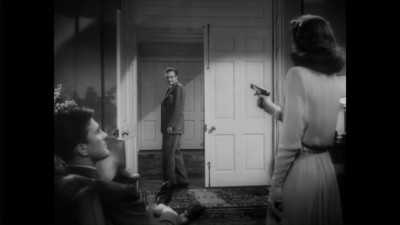
Thanks to someone, somewhere allowing the film's copyright to expire in the 1970s, The Strange Love of Martha Ivers has spent years bouncing around a murky public-domain limbo of its own, despite having been an Oscar-nominated (for future The Hustler director Robert Rossen's screenplay) "A" picture for Paramount at the time of its release. It was a shame that this fine, very worthy work, which is well-crafted throughout and often rises to the level of noir poetry by way of Dickensian melodrama, should have been so unfairly neglected, the market flooded (as is typical for public-domain titles) with awful-quality DVDs and >the one decent DVD edition now out of print and going for outrageous prices. But now that the film has undergone a modest, flawed, but welcome rescue effort at the hands of home video distributors Film Chest/HD Cinema Classics, we once again have the opportunity to see how very well the film's Gothic-romance and gritty/treacherous-streets elements work together, especially as welded into beautiful shapes on celluloid by director Milestone and his team (with particular credit due to Milner and the art and production-design departments). The filmmakers create a world whose shadows and light visually convey the incompatible desires battling it out inside the characters; for just one smartly imagined and evocatively filmed/edited example, when Martha shows off the childhood mansion she now calls her own to the bemused Sam, it's too well-lit, too spacious in contrast to the rainy-windowed, cloistered, low-rent cold of most of the rest of the film's mise-en-scène, so much so that it seems eerie, odd, duplicitous; when the two of them are shot from behind as, in a repetition of the same shot, Martha opens grand door after grand door onto more and more too-spacious, overbright space, it's as if she's offering to open herself up to Sam but now, due to the life she's led in the years that have separated them, has nothing inside but deceptively attractive hollowness.
The film offers plenty of such rich, exciting visual storytelling, astonishingly reverberant visual/aural moments that take our breath away while reminding us how creative Hollywood's directors, cameramen, and writers of the time managed to be within the well-equipped confines of the studios. We don't lack for readily available, deservedly famous and celebrated screen gems from that era, of course, many of which even more beguilingly benefit from such inspired use of Hollywood resources. But The Strange Love of Martha Ivers is a picture whose loss to the whims of time has never really been remedied by the rediscovery and revival of reputation that DVD/Blu-ray can grant to such submerged treats, and this newly remastered rerelease, though not quite top of the line, still represents the return of a prodigal film that should be welcomed with enthusiastically open arms by aficionados of film noir, melodrama, or classically high-quality, golden-era studio fare.
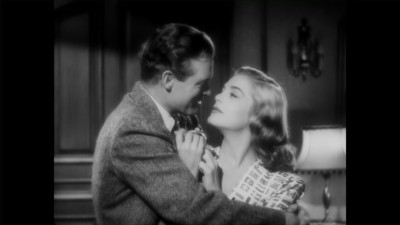
THE BLU-RAY DISC:
The AVC-encoded, 1080p-mastered high-def transfer is passable but below average. The film looks okay, and, as the restoration demo in the extras shows, it certainly could have been noticeably worse: there are still scratches and tiny frame stutters intermittently, and flicker throughout. But the real problem here is the overuse of DNR (digital noise reduction), the blanket-solution, poor man's version of true, in-depth digital authoring/transferring of works on celluloid. DNR removes in fell swoops the most noticeable kinds of visual flaws from beat-up source materials, but it also takes away in the process the true celluloid grain of the picture, leading to an over-mediated, flattened-out, too-slick visual experience that mutes the true pictorial quality of any non-digital (e.g., celluloid) original film materials. It's a decent transfer that hardly ruins movie, and the unusually low retail price of the Blu-ray/DVD combo package is low enough to reflect the money that HD Classics saved by visibly cutting corners. But The Strange Love of Martha Ivers is a good enough film that it could stand to be rescued by a company in less of a hurry and on less of a budget, and by consumers willing to pay a bit more for a more accurately cinematic experience.
Sound:The sound is not perfect but has been quite nicely restored, with only a little distortion, fuzz, or crackle to be heard on this Dolby Digital 2.0 restoration of the film's originally monaural sound.
Extras:Both the newly cut, disc-only trailer that distributor HDClassics has put together for this release and the feature audio commentary with author Walter Hale, reflect the mid-range quality of the package overall. Neither the obviously non-original trailer nor Hale's stuttering, crusty, knowledgeable-enough but not very articulate commentary are egregious, but they're hardly essential, either. Promotional materials for the film, which fell into the public domain long ago, are probably no longer available, at least to non-studio releasers, so that can be overlooked; the commentary is subpar, though, and any number of better-suited, equally inexpensive experts could surely have been recruited. The package also includes a one-minute restoration demonstration, which is convincing enough that some work has been done to improve the film's picture from the passed-around print used (though the upgrading for disc has not been of the most painstaking or high-quality extent); a nicely designed promotional postcard; and the standard-definition (DVD) version of the film.
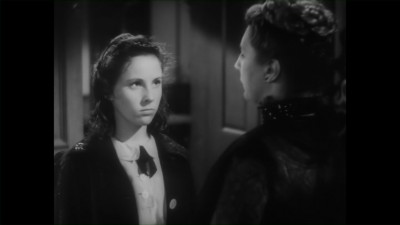
The Strange Love of Martha Ivers is an extravagantly noirish melodrama (or, if you prefer, melodramatic noir, like Michael Curtiz's Mildred Pierce) that, in addition to marking the screen debut of Kirk Douglas, is another ravishing gleam from Barbara Stanwyck's star as the titular femme fatale, who, unlike Stanwyck's black-hearted Phyllis Dietrichson in Double Indemnity, is ultimately sympathetic. With her dark past and the values of the mean little town she's stuck in trapping her in empty wealth and a loveless marriage, Martha Ivers is a victim of her circumstances to the same degree that the men in her life -- her current puppet-politician husband and a childhood love she almost left Iverstown with, who now has the coincidental but immense misfortune of finding himself back in Martha's sights -- are in turn prey to her restless, loveless, and even murderous sense of loss and dissatisfaction. The fateful love triangle and the overarching, malevolent environment in which it plays out -- the snapping jaws of a town without pity that corrupts everyone it ensnares and doesn't let anyone leave without a struggle -- are brought to seething, darkly poetic life by all the players, screenwriter Robert Rossen's adept structuring and always heightened dialogue that alternates between poetry of the street and of the heart; cameraman Victor Milner's chiaroscuro interiors and shimmery-black, neon-lit, maze-for-rats streets (shown always at nighttime, of course), and director Lewis Milestone's skilled orchestration of all these talents into a perfectly-pitched, darkly melancholy little interlude in the rich symphony of '40s film noir. It doesn't quite reach the Olympian heights of a Laura, a Pierce, or an In a Lonely Place, but it's in the same unmissable league; the only reason to hesitate on snapping up this release is its below-average picture quality. Still, it's far from a ruinous presentation; as an inexpensively-priced stopgap to pass until a hoped-for future disc does full justice to the visual dimension of the film's captivating dance between dark and light, it's an okay edition that deserves to hold The Strange Love of Martha Ivers's place on that shelf every cinephile has reserved for fine specimens from the Hollywood studios' golden era. Recommended.
|
| Popular Reviews |
| Sponsored Links |
|
|
| Sponsored Links |
|
|
| Release List | Reviews | Shop | Newsletter | Forum | DVD Giveaways | Blu-Ray | Advertise |
|
Copyright 2024 DVDTalk.com All Rights Reserved. Legal Info, Privacy Policy, Terms of Use,
Manage Preferences,
Your Privacy Choices | |||||||









